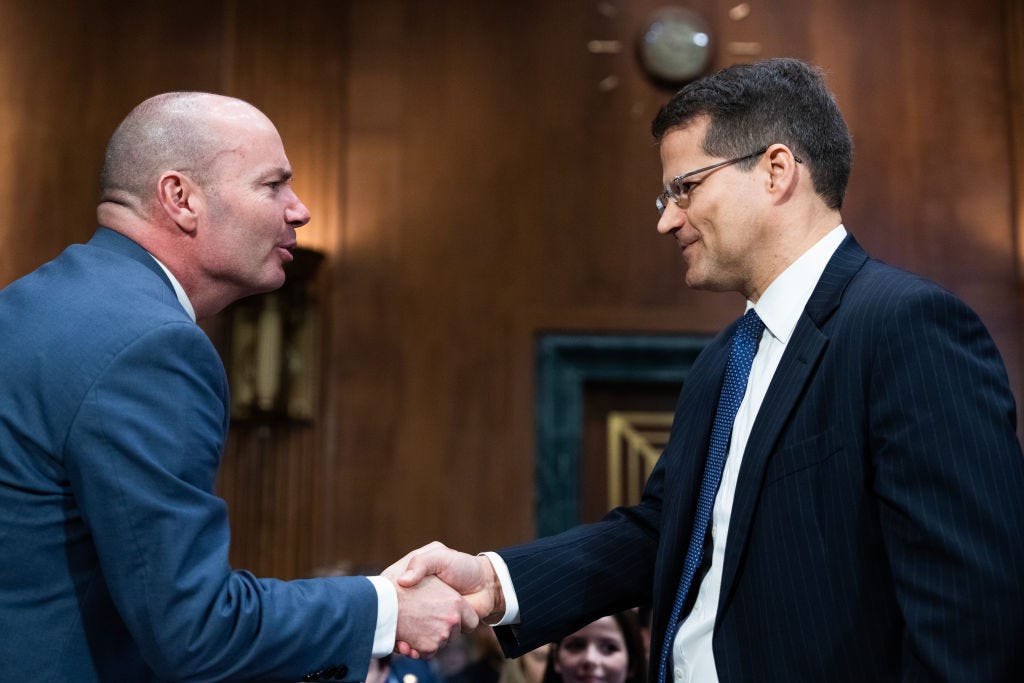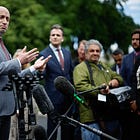The Trump admin's mockery of the courts goes beyond defiance
They're playing games by brazenly changing the arguments they present to judges.

🏛️ ⛲️ 🏛️ With corporate outlets obeying in advance, supporting independent political media is more important right now than ever. PN is possible thanks to paid subscribers. If you aren’t one already, please click the button below to sign up and support our work. 🏛️ ⛲️ 🏛️
It’s no secret that Trump has been flouting court orders. But that’s not the only way the president and his henchpeople at the Department of Justice are expressing their disdain for the judicial branch.
The Trump administration is also brazenly changing its arguments on the fly — often in front of the same court — when faced with a loss or ruling that they don’t like.
That’s what happened in DVD v. United States, where the administration deported eight individuals to South Sudan, though they are currently being held in neighboring Djibouti. In this case, the administration tried both approaches, first defying the court and then trying to reverse course on their own arguments.
US District Judge Brian Murphy entered a preliminary injunction back in April, saying detainees could not be removed to a third country without written notice to the detainee and counsel, if any, in a language the detainee understands. The administration was also ordered to allow detainees a “meaningful opportunity” to raise credible fears of persecution or torture. In addition, migrants were to be given a minimum of 15 days to reopen immigration proceedings to challenge their removal to a third country.
But that isn’t what happened. Instead, eight people were deported with less than 24 hours’ notice, no access to counsel, and no information about South Sudan, despite that country being considered so dangerous that the US government warns people not to travel there.
On May 20, Murphy called an emergency hearing after attorneys for the plaintiffs notified him that a deportation flight was potentially leaving for South Sudan. Though Murphy found that the government had “unquestionably” violated his order, he nonetheless worked with the administration to craft a remedy, extending them a grace they certainly don’t deserve.
Plaintiffs’ counsel argued that the only remedy for the unlawful removal and failure to provide due process was to return the detainees to the United States to challenge their removal. When asked by Judge Murphy what remedy the government proposed, the DOJ attorney said that bringing the detainees back was too broad, but agreed that conducting reasonable fear interviews where the detainees were currently located was feasible. An ICE assistant director told the court, “I know it's possible and the department can work it out. We've been working on it for the last couple of hours to make sure that we can do it, and it is possible to do it." Judge Murphy told the government that if they wanted to do interviews overseas, “you have to do them appropriately: if you don't want to, you can always bring them home of your own volition and do it there.”
A note from Aaron: Working with brilliant contributors like Lisa takes resources. If you aren’t already a paid subscriber, please sign up to support our work.
After getting this pretty sweet break from Judge Murphy, the DOJ proceeded to do nothing for the detainees, but they did come back to Murphy with a motion for reconsideration of his holding or that he stay his holding pending the government’s appeal. There, they argued that it was just too hard to do reasonable fear interviews overseas in whatever country they had stashed the detainees. They whined that the court had imposed new unfair burdens, including requiring the interview to be conducted in private, providing detainees with attorney contact information, and granting them access to a phone and an interpreter. So, they asked Murphy to rule that the government had already provided a “meaningful opportunity” to contest their removal, and then wrote a lot of words about how no one can tell the president what to do when it comes to immigration.
This did not sit well with Murphy, who dropped an order on Memorial Day that explained he had granted the exact narrow remedy the government requested: the ability to do reasonable fear interviews overseas rather than having to bring the detainees back to the United States. Needless to say, Murphy did not grant the motion for reconsideration or a stay.
Making it up as they go
These blatant stalling tactics are not new for the administration. It’s basically the same thing they did in a different case before Judge James Boasberg, JGG v. Trump.
This is the case where Judge Boasberg ordered the administration to immediately stop the deportation of hundreds of Venezuelans to El Salvador’s notorious Terrorism Confinement Center (CECOT), including turning the planes around if necessary. But the administration did not turn the planes around, instead trying out a variety of excuses for not following the order, including “the planes were in international waters,” “only written orders count,” and their old standby, “no one can tell the president what to do when it comes to immigration.”
As with the case before Judge Murphy, the administration hasn’t just defied orders here. They’ve also made up new arguments whenever it suits them. During the hearing where Judge Boasberg was trying to figure out exactly where the planeloads of detainees might be while the government was trying to stall, the DOJ attorney said he had learned of “operational details” that “raised potential national security issues” and therefore couldn’t discuss anything in a public courtroom. He offered to provide the court with additional information, but only in camera — outside the presence of the public. Boasberg obliged, at which point the government admitted that they didn’t actually have any additional details, but totally would share them if they did.
In a subsequent hearing, the DOJ attorney refused to provide any details about deportation flights, saying it could not be shared, even with the judge, because of “diplomatic concerns.” That might have landed with Judge Boasberg, except that he had already seen Donald Trump’s three-minute Truth Social propaganda video that contained several operational details and Secretary of State Marco Rubio’s high-def video on X where you could see the planes, runway, how migrants were transported, the faces of detainees and guards, the entrance to CECOT, and the inside of the prison.
While insisting they did not need to provide details, government officials did tell Judge Boasberg that if he ordered it to provide those details, they would only do so via “an in camera and ex parte declaration”— outside of the presence of the public and outside the presence of the plaintiffs or their attorneys. Boasberg did order them to do just that and to provide answers to five very basic questions: when the flights took off from and where, when the planes left US airspace, when they landed in a foreign country, what time people were transferred out of US custody, and how many people were on the flights.
But instead of answering, the administration changed course and informed the court that it was considering invoking the state secrets privilege and needed more time to decide, and it would definitely not be sharing any details until then. Six days later, it invoked the state secrets privilege, refusing to provide further information and, you guessed it, arguing that no one can tell the president what to do when it comes to immigration.
In multiple immigration cases, the administration has argued that there is only one way that detainees can challenge their detention: via a petition for a writ of habeas corpus. A habeas writ requires the government to bring the detainee before the court to determine if their imprisonment is lawful. That’s a scummy argument in that it requires each detainee to figure out how to raise a habeas challenge while the administration is shuffling them around the country or secretly deporting them overseas, but at least it’s an argument with some legal foundation.
Habeas is frequently used to challenge immigration removals, though it is not the exclusive way to do so. The problem is that the Trump administration quickly made abundantly clear it had no intention of letting immigrants meaningfully petition for habeas relief. In the case about the wrongful deportation of Kilmar Abrego Garcia, they gave away the game, arguing that “because Plaintiffs' claims sound in habeas, they can proceed only in habeas. But because Plaintiffs concede that Abrego Garcia is not in United States custody, this Court cannot hear those claims.” Yes, the administration deported Abrego Garcia in error and with no due process, claimed habeas was his only way to obtain relief, and then smugly argued that Abrego Garcia can’t bring a habeas claim any longer because no US court has jurisdiction now that he is in El Salvador.
Not content to show the futility of habeas case by case, the administration has pivoted to saying it may entirely suspend the right of habeas corpus instead. That would remove even the meager protections that detainees are owed and make the administration’s actions largely unreviewable by the courts. Sure, that suspension is only supposed to happen in “cases of rebellion or invasion the public safety may require it,” but the administration has constructed a fantasy world where the United States is under siege from an invasion of Venezuelan members of the Tren de Aragua gang. Actual experts on violence in Venezuela have said that TdA is not invading America, the same thing that our own intelligence community found, a conclusion which so irked Joe Kent, the chief of staff for Director of National Intelligence Tulsi Gabbard, that he pushed for a rewrite “so this document is not used against the DNI or POTUS.”
Typically, one would hope that major intelligence decisions are not made based on whether Tulsi Gabbard and Donald Trump come out looking good, but that’s where we are now. The administration will keep changing arguments, altering reports, and doing anything it can to block challenges to its authority to deport people without any due process.
Bottomless contempt
The administration will also keep running to the friendly confines of the Supreme Court. It did so this week to beg them to let them deport people with no due process and argue that the secret deportations of our allegedly worst criminals to South Sudan were part of efforts to “quietly rebuild a productive working relationship” with that country. Entering into a joint human trafficking effort with the United States seems like a weird way to rebuild a productive relationship, but just in case the Court doesn’t buy that, there’s more assertions in their filing about how no one can tell the president what to do when it comes to immigration.
The DOJ’s contempt for the courts goes all the way to the top. Solicitor General John Sauer, who got his job by being one of Trump’s numerous criminal defense lawyers, startled Justice Amy Coney Barrett during the birthright citizenship oral arguments by arguing it was the DOJ’s “general practice” to respect precedents it did not agree with, but “there are circumstances when it is not a categorical practice” and this flexible position on precedent was a “long-standing practice at the Department of Justice.”
The only problem is that this is not a long-standing practice at the Department of Justice or anywhere else, which is likely why Justice Barrett could only respond, “Really?”
JUSTICE BARRETT: I'm talking about this week the Second Circuit holds that the executive order is unconstitutional, and then what do you do the next day or the next week?
GENERAL SAUER: Generally, we follow that.
JUSTICE BARRETT: So you're still saying "generally."
GENERAL SAUER: Yes.
JUSTICE BARRETT: And you still think that it's generally the policy, longstanding policy, of the federal government to take that approach?
GENERAL SAUER: That is my understanding.
Sauer probably has good cause to be a bit cocky here, regrettably. He argued — and won — the presidential immunity case, so he’s likely feeling pretty good about his chances at the Supreme Court.
If the conservatives on the Court are willing to invent immunity for Trump out of thin air, they’re likely down with letting him flout court orders and contradict their own arguments, all in the service of maximizing presidential authority. Indeed, maximizing Trump’s power might be this administration’s only consistent argument.
That’s it for today
We’ll be back with at least one special edition this weekend. If you appreciate today’s newsletter, please support our work by signing up. Paid subscribers make Public Notice possible.
Thanks for reading, and for your support.






I love Lisa’s writing! She lays her story out so well without getting lost in the weeds! Thanks PN!
When you have a felon (yes, I'm talking about you, TACOman) who was convicted of 34 counts for falsifying business records, lost 2 cases of sexual abuse and defamation against E. Jean Carroll and continues to give the middle finger to court ruling against him, it's not at all surprising that he would appoint shyster lawyers who have not one ounce of respect for the courts or the rule of law. It is high time that we stopped calling it the Department of Justice and renamed it the Ministry of Injustice or the Illegal Deportation Committee.